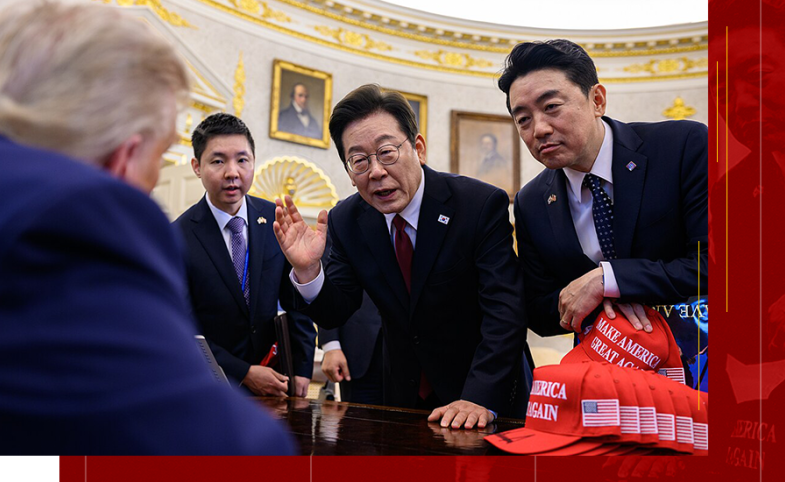The CPD Blog is intended to stimulate dialog among scholars and practitioners from around the world in the public diplomacy sphere. The opinions represented here are the authors' own and do not necessarily reflect CPD's views. For blogger guidelines, click here.

Public Diplomacy in the News: K-Culture Policy Push, World Cup Diplomacy & Global AI Governance
“Public Diplomacy in the News” is a CPD Blog series by Andrew Dubbins that spotlights noteworthy stories on public diplomacy topics such as cultural diplomacy, nation branding, exchange programs, international events and conferences, digital diplomacy, and strategic global communications.
K-Culture policy push. South Korea officially launched the Presidential Committee on Popular Culture Exchange, a 39-member advisory body under President Lee Jae Myung (pictured above at center), to strengthen collaboration between government and the private sector in advancing K-culture worldwide. At the inauguration, co-chaired by Culture Minister Chae Hwi-young and JYP Entertainment founder J.Y. Park, the committee outlined ambitions to create global festivals surpassing Coachella and to elevate Korea’s cultural influence in music, gaming, film, webtoons, food, and beauty. With leaders from top firms such as Hybe, YG, SM, CJ ENM, and Naver Webtoon, the committee will coordinate cultural policy, industry growth, and international exchange. In tandem, the Ministry of Culture established a 90-member Cultural Arts Policy Advisory Committee, ensuring diverse voices across the arts contribute to shaping Korea’s vision of becoming a $214 billion global cultural powerhouse.
Kim Jae-heun / The Korea Herald
World Cup as diplomatic leverage. With the United States set to host the 2026 World Cup, President Donald Trump has embraced the tournament as a powerful tool in foreign policy, wielding visa access and tournament participation to influence conflicts and negotiations. He has pledged to block efforts to suspend Israel from international soccer, floated reinstating Russia’s participation as an incentive for ending the Ukraine war, and vowed to bar Iranian fans under his travel ban. Brazilian officials fear similar restrictions could be used to pressure trade talks, while other nations eye how Trump might leverage the event for geopolitical gain. By intertwining sports and diplomacy, Trump is positioning the World Cup as both a showcase of American power and a bargaining chip in resolving global disputes.
Sophia Cai, Tim Röhn and Eric Bazail-Eimil / Politico
Global A.I. governance drive. The United Nations has launched a “global dialogue on artificial intelligence governance” and announced a 40-member panel of experts to assess A.I.’s risks and opportunities, aiming to position itself as the central forum for shaping the technology’s future. Delegates at the General Assembly voiced both optimism and alarm, citing potential breakthroughs in health, agriculture, and education alongside threats of surveillance, misinformation, and inequality. While the U.S. under the Trump administration rejected centralized regulation, China has embraced the initiative, framing A.I. as a tool that must not become “hegemonic.” Secretary General António Guterres called the effort a step toward a “new architecture of technology governance,” with experts and Nobel laureates urging international guardrails to prevent catastrophic risks such as autonomous weapons, engineered pandemics, and mass unemployment.
UNESCO expands biosphere protection. UNESCO has designated 26 new biosphere reserves across 21 countries, marking the largest annual expansion in two decades and bringing the World Network of Biosphere Reserves to 784 sites in 142 nations. Six countries—Angola, Djibouti, Equatorial Guinea, Iceland, Oman, and Tajikistan—received their first designations, while São Tomé and Príncipe became the first state with its entire territory recognized as a biosphere reserve. Covering over 8 million km² worldwide, these reserves safeguard critical ecosystems and support nearly 300 million people, serving as “living laboratories” for balancing conservation with sustainable development. The move, announced during the 5th World Congress of Biosphere Reserves in Hangzhou, China, underscores UNESCO’s role in advancing the Kunming-Montreal target of protecting 30% of land and sea by 2030, while fostering community initiatives, Indigenous knowledge, and partnerships with the private sector to address biodiversity loss and climate challenges.
Visit CPD's Online Library
Explore CPD's vast online database featuring the latest books, articles, speeches and information on international organizations dedicated to public diplomacy.
POPULAR ARTICLES
-
January 29
-
January 20
-
January 28
-
January 2
-
January 8
Join the Conversation
Interested in contributing to the CPD Blog? We welcome your posts. Read our guidelines and find out how you can submit blogs and photo essays >.









